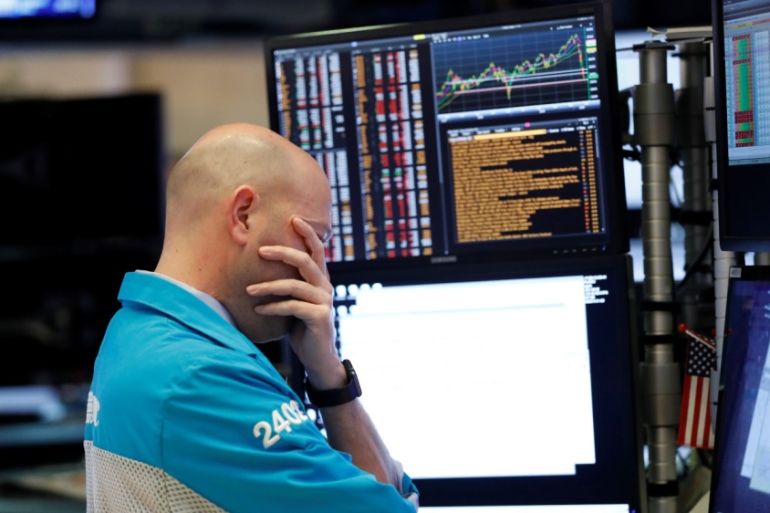Beware the bears: Shares sink after Trump halts Europe arrivals
Global share prices sank as analysts said they were sceptical about Trump’s measures to curb the coronavirus outbreak.

A slew of policies announced by US President Donald Trump to curb the coronavirus outbreak failed to gain investors’ confidence as global stocks recorded fresh losses on Thursday.
Pessimism on Wall Street, which on Wednesday sent the Dow Jones Industrial Average into a bear market – defined as a fall of more than 20 percent from a recent high – flowed through Asian markets, driving shares to multiyear lows.
Keep reading
list of 3 itemsAsian shares tumble after Trump halts all travel from Europe
Can travel bans prevent coronavirus’s spread? Airlines say no
Japan’s Nikkei 225 index fell 5.3 percent, putting it deeper in bear market territory, while China’s blue-chip stocks sank 1.7 percent.
South Korea’s Kospi declined 4.6 percent to its lowest in more than four years, while Hong Kong’s Hang Seng Index slipped as much as 4 percent to touch its lowest level since April 2017.
Australia’s shares were among the worst hit, falling 7.4 percent. Its government announced a stimulus package of 17.6 billion Australian dollars ($11.4bn) on Thursday, its first since the 2008 global financial crisis.
Australian Prime Minister Scott Morrison said the government will subsidise the wages of 120,000 apprentices, offer one-off cash payments for welfare recipients and give small businesses up to 25,000 Australian dollars ($16,160).
MSCI’s broadest index of Asia-Pacific shares outside Japan declined 4.1 percent to a one-year low.
And the wave of selling pushed through into Europe, with the main benchmark share indices in the UK, Germany and France plunging more than five percent in early trading. The European Central Bank was widely expected to announce stimulus measures to help protect the region’s economy from the effects of the virus.
On Wednesday, Trump announced that all travel from Europe into the US would be suspended for the next 30 days, except for those travelling from the United Kingdom. He also said he would propose stimulus measures such as payroll tax cuts for individuals and businesses to the US Congress.
“It’s clear that [Trump] needs bi-partisan support for any fiscal measures. Senate is going away next week, which I find unbelievable … so I’m struggling to see how he’s going to get bipartisan support for any fiscal response,” Jeffrey Halley, senior market analyst for Asia Pacific at trading firm OANDA, told Al Jazeera.
Trump’s travel suspension also cast gloom over global economic prospects. Before his announcement, the World Health Organization classified the outbreak as a pandemic.
“The general lockdown on economic activity is having more weight on markets than the virus itself,” Freddy Lim, chief investment officer of investment platform Stashaway, told Al Jazeera.
Lim said Trump’s travel suspension came as a surprise; something markets did not take well.
Investors flocked to safe-haven assets, including US Treasury bills, which saw yields on 10-year notes falling 11 basis points to 0.76 percent. Bond yields fall as their prices rise.
The Japanese yen and gold, also considered safer investments than equities in times of economic turmoil, also gained. The yen climbed 0.5 percent to 104.01 per US dollar while gold was up 0.6 percent to $1,645.25 per ounce.
Trump’s measures, announced from the Oval Office of the White House late on Wednesday, included financial relief for workers who are “ill, quarantined or caring for others due to coronavirus”.
The US president also said tax payments would be deferred for some individuals and businesses for three months to reduce the effects of the virus outbreak. The Small Business Administration will make low-interest loans available to businesses to help them weather the storm, he said.
“This is not a financial crisis,” he said. “This is just a temporary moment of time that we will overcome together as a nation and as a world.”
But many analysts are sceptical that policymakers can do much more to stimulate the economy. Gerald Ambrose, CEO of Aberdeen Standard Islamic Investments in Malaysia, told Al Jazeera that interest rate cuts by the Federal Reserve could be squeezing liquidity in the banking sector instead.
“The last cut didn’t do anything; (in fact) Wall Street fell further after that,” he said.
The Federal Reserve’s shock rate cut on March 3 was accompanied by a statement from Chair Jerome Powell that acknowledged lower interest rates would not reduce the rate of infection due to the coronavirus.